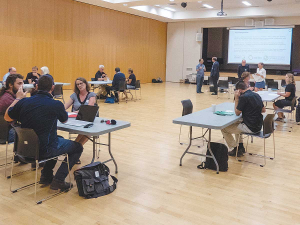Beef Progeny Test 2025: Genetic insights for NZ beef industry
At Pāmu’s Kepler Farm in Manapouri, mating has wrapped up at the across-breed Beef Progeny Test.
 Researchers Tommy Ley, far left, and Steve Breneger explain their project during the “speed dating” segment of an innovative event at Lincoln in which scientists presented updates into several research projects then had a series of face-to-face chats with journalists and others attending the event. Photo: Rural News Group.
Researchers Tommy Ley, far left, and Steve Breneger explain their project during the “speed dating” segment of an innovative event at Lincoln in which scientists presented updates into several research projects then had a series of face-to-face chats with journalists and others attending the event. Photo: Rural News Group.
State-owned farmer Pāmu has been able to reduce nitrogen input on its Waimakariri dairy farm while maintaining milk and grass production, by using fertigation – the application of fertiliser through irrigation.
The farm applied 42% less nitrogen last season compared with the previous season, while both grass and milk production remained comparable with past seasons, according to research by Lincoln University masters student Tommy Ley and Irrigation NZ’s technical manager Steve Breneger.
Pāmu installed the fertigation system on the farm in November 2018. Ley and Breneger are conducting a study into its effectiveness.
Grass production is similar and milk production up on previous years, said Breneger.
“The numbers are still stacking up that it’s actually being quite a positive move.”
The pair’s research is funded by the Sustainable Farming Futures Fund, with support from Ballance Agri-Nutrients, Fertigation Systems and Molloy Ag. They spoke at an innovative “The Secret’s In The Soil” presentation day at Lincoln, where nine different teams all presented updates into various research projects on the theme of irrigation’s effects on soil.
Ley and Breneger’s study aims to determine whether fertigation improves yield, nitrogen use efficiency and clover content in perennial ryegrass/white clover pastures, and whether it has lower nitrogen losses, compared with conventional fertiliser.
Their study included two experiments at two different sites using fixed amounts of fertiliser, as well as the farm-scale trial at Pāmu.
Ley said fertigation allowed farmers to apply fertiliser when it was needed, in a liquid form, and more frequently.
“It essentially means you can maintain lower constant nitrogen in the soil. Therefore you’re going to reduce the amount of total nitrogen losses you can possibly get from the pasture.”
Fertigation was commonly used in horticulture systems, but there was a lack of literature into its use in pasture, he said.
Breneger said that like all the big corporates, Pāmu was looking at how to achieve the reductions in N-leaching they have to make over the next few years.
Installing their fertigation system was more about tailoring it to be sustainable, not just increase yield or milk, he said.
The system chosen by Pāmu uses a 30,000 litre nurse tank near the shed, and then a 5,000l trailer which is towed to the base of each pivot as required.
Alternative systems might use pipelines to each pivot, which would be the high capital cost option, or individual fixed tanks at each pivot, which would mean frequent on-farm access by non-farm staff.
Norwood has announced the opening of a new Tasman dealership at Richmond near Nelson next month.
Buying or building a rural or semi-rural property? Make sure you know where the wastewater goes, says Environment Canterbury.
With collars on more than seven million cows worldwide, Nedap says its standalone launch into New Zealand represents world-leading, reliable and proven smart technology solutions for dairy farmers.
The Meat Industry Association (MIA) is once again looking for game-changing ideas for New Zealand's red meat processing and exporting sector.
Environment Southland is inviting feedback on two bylaws that play a critical role in safeguarding the region's waterways and ensuring the safety of the local community.
While the North Island is inundated with rain, Southland is facing receding water levels as warm weather and lack of rainfall continues.

OPINION: Meanwhile, red blooded Northland politician Matua Shane Jones has provided one of the most telling quotes of the year…
OPINION: This old mutt has been around for a few years now and it seems these ‘once in 100-year’ weather…